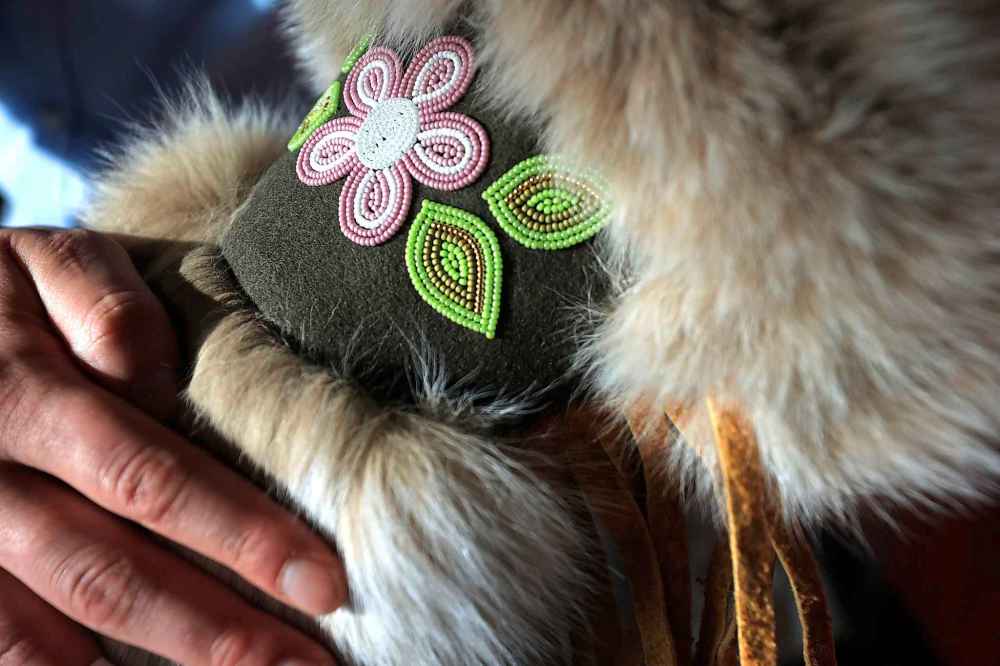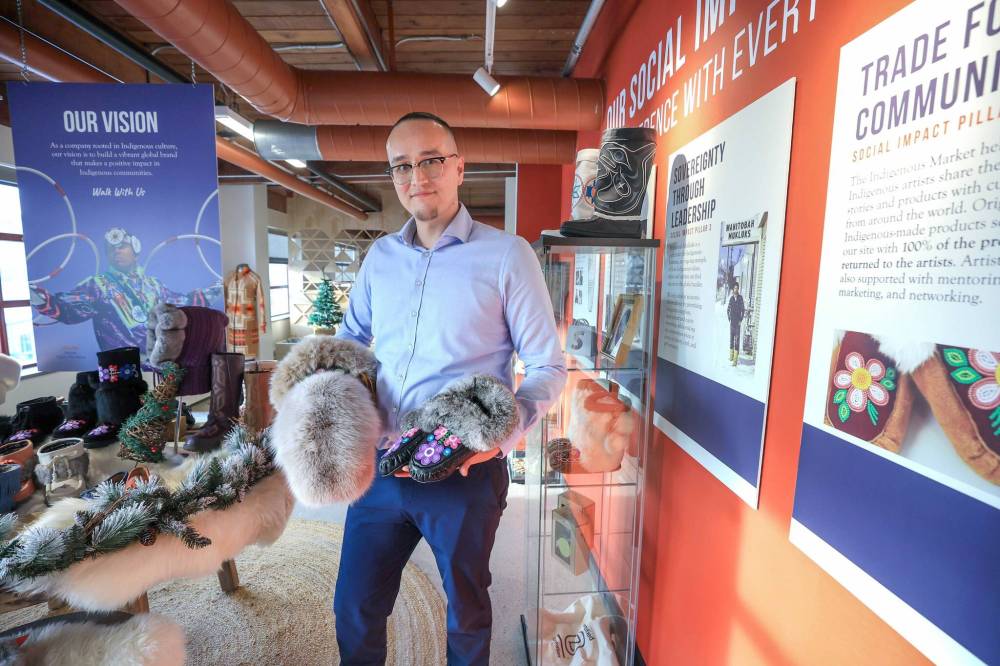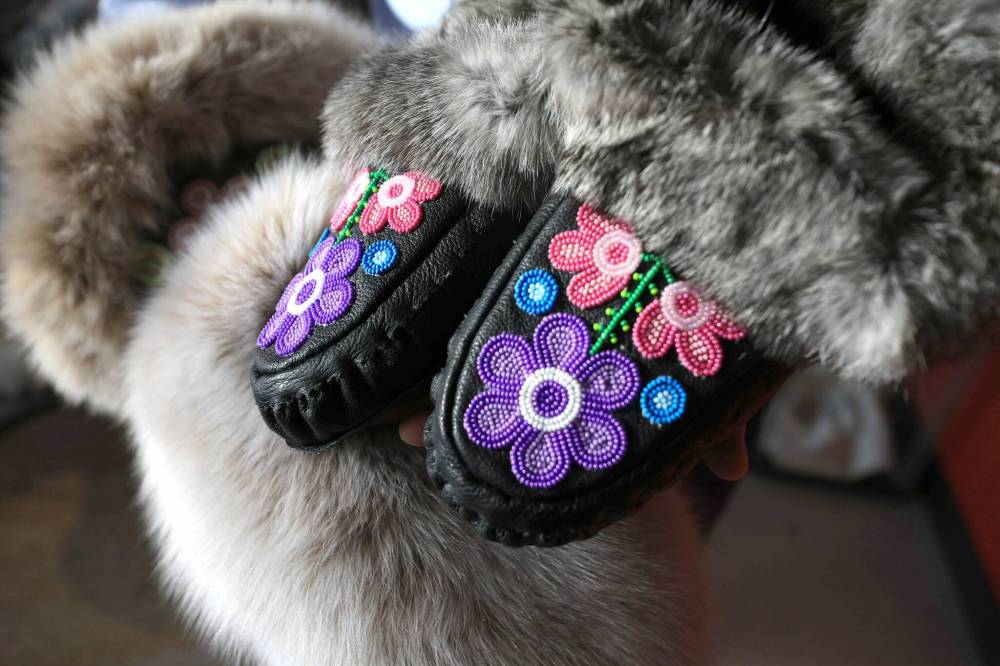Pillars of community, success
‘We cannot take without giving something back’: Manitobah annual social impact report highlights achievements
Advertisement
Read this article for free:
or
Already have an account? Log in here »
To continue reading, please subscribe:
Monthly Digital Subscription
$1 per week for 24 weeks*
- Enjoy unlimited reading on winnipegfreepress.com
- Read the E-Edition, our digital replica newspaper
- Access News Break, our award-winning app
- Play interactive puzzles
*Billed as $4.00 plus GST every four weeks. After 24 weeks, price increases to the regular rate of $19.00 plus GST every four weeks. Offer available to new and qualified returning subscribers only. Cancel any time.
Monthly Digital Subscription
$4.75/week*
- Enjoy unlimited reading on winnipegfreepress.com
- Read the E-Edition, our digital replica newspaper
- Access News Break, our award-winning app
- Play interactive puzzles
*Billed as $19 plus GST every four weeks. Cancel any time.
To continue reading, please subscribe:
Add Winnipeg Free Press access to your Brandon Sun subscription for only
$1 for the first 4 weeks*
*$1 will be added to your next bill. After your 4 weeks access is complete your rate will increase by $0.00 a X percent off the regular rate.
Read unlimited articles for free today:
or
Already have an account? Log in here »
Hey there, time traveller!
This article was published 05/02/2025 (238 days ago), so information in it may no longer be current.
Rhonda Chartrand credits Manitobah with supporting her development as an artist.
The 31-year-old Anicinabe artist from Sagkeeng First Nation learned how to make mukluks, moccasins and gauntlets through the Storyboot School, which the company (formerly called Manitobah Mukluks) founded in 2013.
The school brings Indigenous artists together with students from across Canada for free courses that teach traditional Indigenous arts. Chartrand took her first course in 2018, and is among the school’s 1,759 graduates. She’s since become a skilled artisan whose work is sold via Manitobah’s website.

“When I was younger, I didn’t even know what moccasins or mukluks were; our family was so non-traditional, we didn’t have that,” Chartrand said. “(Manitobah) opened the doors for me to reconnect to my culture (and) the traditional arts.”
Such stories are important to Manitobah. Started in 1997 by Métis entrepreneur Sean McCormick, the company has since grown into a globally recognized brand.
But making a difference is just as important to Manitobah leadership as selling moccasins. The company uses four “impact pillars” — education for change, trade for community, art in action and sovereignty through leadership — to contribute to the broader community.
“One thing we’re seeing is that as the company grows, so does the impact,” said Daman Morissette, vice-president, social impact. “We cannot take without giving something back.”
Manitobah provided an update on its achievements in its 2024 social impact report, released last month. The reporting period spans from April 1, 2023 to March 31, 2024.
In 2024, the Storyboot School — part of the company’s “education for change” pillar — offered more than 160 hours of instruction over 37 classes. Seventy-five people graduated from the program.
Manitobah’s “trade for community” pillar includes the company’s Indigenous Market, which helps Indigenous artisans sell their products through Manitobah’s website. In 2024, it received $200,000 in sales. Artists receive 100 per cent of the profit.
That’s good news for artisans like Rosa Scribe, a Cree woman from Norway House First Nation who was the first person to sell her work through the Indigenous Market.
Inspired by her grandparents, who were accomplished artists, Scribe began beading when she was 12. Now 63, her beadwork is a tribute to her family’s legacy, blending cultural pride and creativity.

RUTH BONNEVILLE / FREE PRESS
‘One thing we’re seeing is that as the company grows, so does the impact,’ says Daman Morissette, vice-president, social impact, at Manitobah business headquarters at The Forks.
The Indigenous Market has allowed Scribe to find a wider audience for her work. In 2024, she partnered with Manitobah to create the “Kokom’s Collection,” a line of black leather footwear that celebrates her grandmother’s artistry with vibrant red, blue, purple and pink beadwork.
Her work is a way for Scribe to engage with her grandparents’ legacy, she said. “It’s an opportunity to learn from them and to reflect on the values they have given to me and preserve traditions they have passed down to me.”
Manitobah’s “art in action” pillar includes showcasing Indigenous art through collaboration with artisans. Since 2020, the company has paid more than $440,000 to collaborating artists. In 2024, it collaborated with seven new artists.
They included Mikailah Thompson, an Afro-Indigenous beadwork artist from the nimiipuu nation (Nez Perce). In 2024, she collaborated with the company to create multiple products, including footwear and scarves.
The 31-year-old especially enjoyed creating the Wallowa moccasin, named after the Wallowa Valley on nimiipuu homeland in the Pacific Northwest.
“I was able to kind of share the story of my tribe and where it came from (and) give insight into our story,” she said by phone from her home in Lapwai, Idaho.
In turn, multiple people reached out and told her that her story spurred them on to learn more. “It’s nice to … receive those emails and hear that people went a step further, literally, to learn about my tribe and our story.”
Manitobah’s fourth pillar, “sovereignty through leadership,” means being a trailblazer for Indigenous business, demonstrating how Indigenous values, ethics and culture can achieve success in the global marketplace.
In 2024, the company spent more than $835,000 at Indigenous vendors and made more than $108,000 in donations.

RUTH BONNEVILLE / FREE PRESS
Beaded moccasins by Rosa Scribe, one of many works of Indigenous artists for sale at Manitobah.
The company also achieved its B Corp certification, joining more than 8,000 for-profit corporations around the world that meet rigorous standards of social and environmental performance, accountability and transparency.
For Morissette, it was one of the highlights of 2024. “Getting B Corp certified on our first attempt was a pretty big standout,” he said.
Manitobah (whose registered business name is Blue Moose Clothing Company Ltd.) is owned by McCormick, Montreal Lake Business Ventures and Endeavour Capital.
The company’s staffing level fluctuates depending on the season. In 2024, Manitobah employed between 50 and 141 people, with an average headcount of 89 employees a month.
The company is headquartered at The Forks in downtown Winnipeg, where its flagship store is also located.
aaron.epp@freepress.mb.ca

Aaron Epp reports on business for the Free Press. After freelancing for the paper for a decade, he joined the staff full-time in 2024. He was previously the associate editor at Canadian Mennonite. Read more about Aaron.
Our newsroom depends on a growing audience of readers to power our journalism. If you are not a paid reader, please consider becoming a subscriber.
Our newsroom depends on its audience of readers to power our journalism. Thank you for your support.
History
Updated on Wednesday, February 5, 2025 6:33 AM CST: Adds photo

